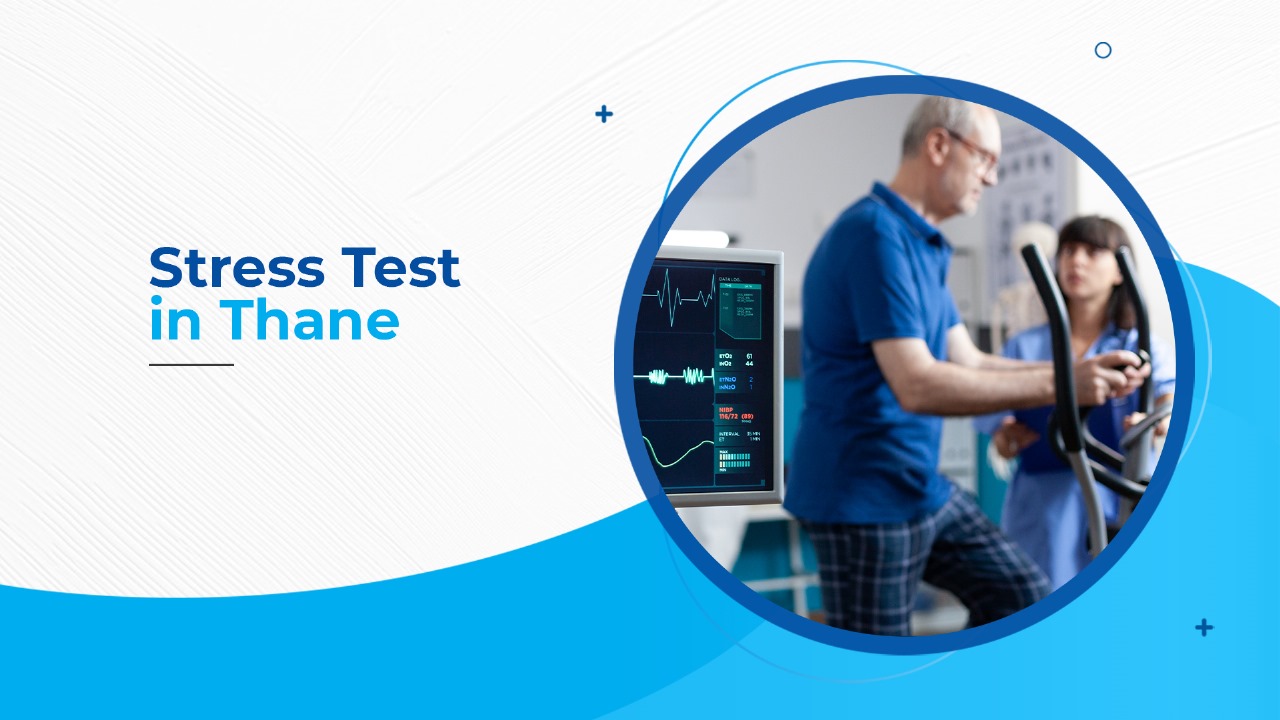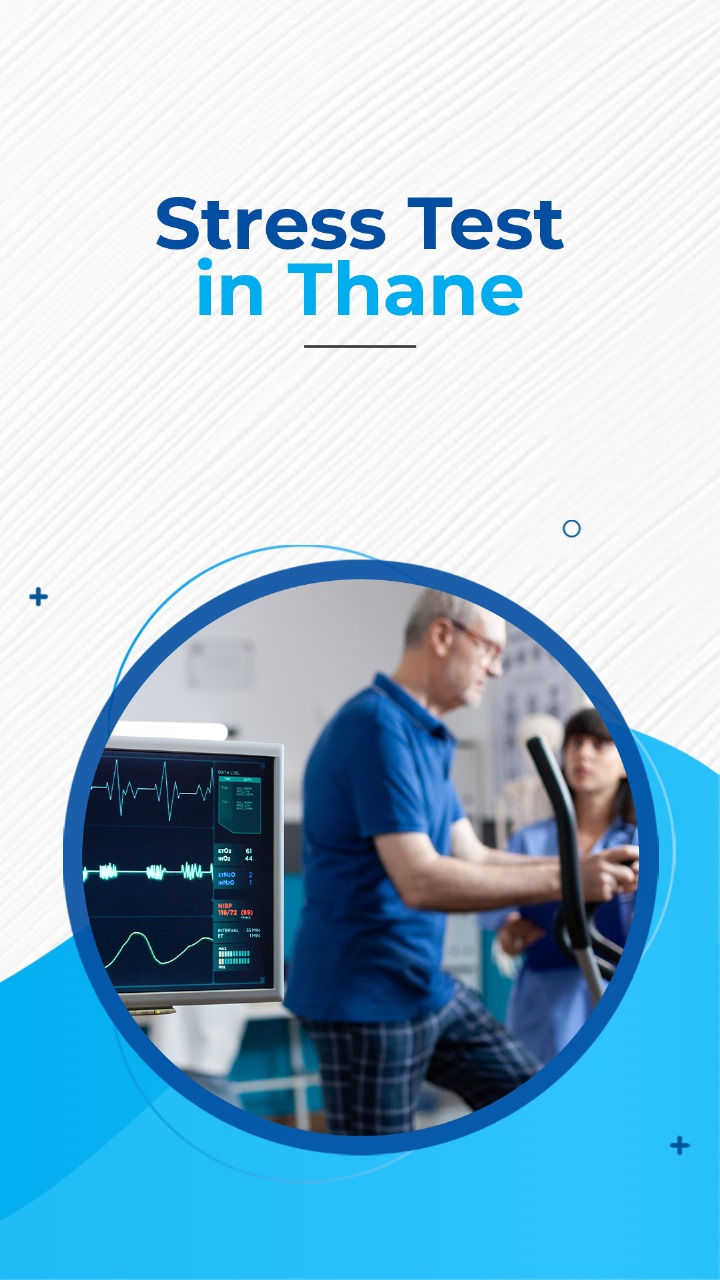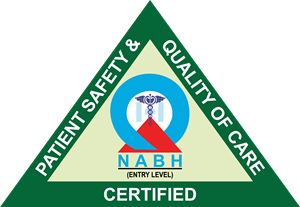Offers a wide range of medical services under one roof, with comprehensive and convenient healthcare
Jinkushal Cardiac Care & Superspeciality hospital
9082386200
Call for appointment
9082386200
Call for appointment


Comprehensive Guide to Stress Tests in Thane at Jinkushal Hospital
Jinkushal Hospital, a preeminent health sanctuary in Thane, is dedicated to delivering unparalleled cardiac diagnostic services. Our suite of stress tests stands at the forefront of detecting and managing heart ailments with precision and care. For individuals searching for a ‘Stress test in Thane,’ we offer advanced diagnostic options, including the ‘echo stress test’ and ‘heart stress test in Thane,’ tailored to individual health needs. Our commitment is to ensure that our patients receive comprehensive evaluations using the latest in medical technology, providing insights necessary for effective treatment planning.

Superspeciality Hospital in Thane
Jinkushal Cardiac Care
Jinkushal Cardiac Care and Superspecialty Hospital is a full-fledged multi-specialty hospital with 30 beds out of which 7beds are dedicated for ICU. It is state of art infrastructure equipped with all high end machines and instruments. The hospital has a CATHLAB which is one of its kind and has inbuilt CT scan and AI which makes it best for treating emergency cases of acute paralysis and heart attack, it also has two Major OTs and a Supramajor OT for cardiac cases.
- 24*7 Emergency Care
- 24*7 Acute Paralysis Unit
- 24*7 Trauma Care
- 24*7 Pathology
- X-Ray
- 24*7 Cardiac Care
- Dialysis With ICU Backup
- 24*7 Pharmacy
- 24*7 Cardiac Ambulance
- 24*7 Acute Heart Attack Unit/Emergency Angioplasty
Google Review
 laxman jangid2024-07-13Jinkushal Hospital is best Cardiac care hospital with its team of exceptional doctors, compassionate nursing staff, and unwavering commitment to hygiene, it consistently delivers comprehensive and patient-centered care. Whether it's routine checkups, complex surgeries, Jinkushal Hospital is undoubtedly one of the best hospitals for all your healthcare needs.
laxman jangid2024-07-13Jinkushal Hospital is best Cardiac care hospital with its team of exceptional doctors, compassionate nursing staff, and unwavering commitment to hygiene, it consistently delivers comprehensive and patient-centered care. Whether it's routine checkups, complex surgeries, Jinkushal Hospital is undoubtedly one of the best hospitals for all your healthcare needs. Sachin Mukadam2024-07-11Very nice hospital. Very clean. Best doctors in town are available. Good staff and very helping nature of all staff and doctors is worth mentioning. Got my relatives knee replacement here. Very good results. Highly recommended for any medical treatment and all surgeries.
Sachin Mukadam2024-07-11Very nice hospital. Very clean. Best doctors in town are available. Good staff and very helping nature of all staff and doctors is worth mentioning. Got my relatives knee replacement here. Very good results. Highly recommended for any medical treatment and all surgeries. Jitendra Khandelwal2024-07-08My self jitendra khandelwal I have done my by pass surgery (CABG) on 26th June at jinkushal hospital . It was very well done hospital is very fantastic with all latest technology and above all Dr.mayur Jain sir is very positive and fantastic person who motivated and felt me it's normal surgery and not so which I thought it's very big surgery . So I suggest any one at least on ghodbunder road thane should visit if your facing any heart issue . I am very much satisfied with my pre and post surgery . Thanks sir
Jitendra Khandelwal2024-07-08My self jitendra khandelwal I have done my by pass surgery (CABG) on 26th June at jinkushal hospital . It was very well done hospital is very fantastic with all latest technology and above all Dr.mayur Jain sir is very positive and fantastic person who motivated and felt me it's normal surgery and not so which I thought it's very big surgery . So I suggest any one at least on ghodbunder road thane should visit if your facing any heart issue . I am very much satisfied with my pre and post surgery . Thanks sir Navneet Jain2024-07-07I would like to extend my heartfelt gratitude to Dr. Mayur Jain and his exceptional team at Jinkushal Hospital in Thane, Maharashtra. As a cardiac specialist, Dr. Jain's expertise and dedication to his patients are truly commendable. From the moment you step into Jinkushal Hospital, you are met with a team of professionals who are not only highly skilled but also deeply compassionate. Dr. Jain and his core team consistently provide outstanding care, ensuring that each patient receives the best possible treatment. Additionally, the administrative team at Jinkushal Hospital deserves recognition for their efficiency and support, making the entire experience smooth and stress-free. I have immense respect for Dr. Mayur Jain and his team, and I am grateful for their continued commitment to excellence.
Navneet Jain2024-07-07I would like to extend my heartfelt gratitude to Dr. Mayur Jain and his exceptional team at Jinkushal Hospital in Thane, Maharashtra. As a cardiac specialist, Dr. Jain's expertise and dedication to his patients are truly commendable. From the moment you step into Jinkushal Hospital, you are met with a team of professionals who are not only highly skilled but also deeply compassionate. Dr. Jain and his core team consistently provide outstanding care, ensuring that each patient receives the best possible treatment. Additionally, the administrative team at Jinkushal Hospital deserves recognition for their efficiency and support, making the entire experience smooth and stress-free. I have immense respect for Dr. Mayur Jain and his team, and I am grateful for their continued commitment to excellence. Saurabh Kumar2024-06-29Best cardiac care hospital in Thane
Saurabh Kumar2024-06-29Best cardiac care hospital in Thane Rupesh Baviskar2024-06-19Very helpful and good staff I am so happy nice treatment….
Rupesh Baviskar2024-06-19Very helpful and good staff I am so happy nice treatment…. H.R.K group2024-06-18All the services r good,staff sport also good
H.R.K group2024-06-18All the services r good,staff sport also good Vinod Abhale2024-06-17Very good attention & treatment received from Dr Mayur Jain, CardiologistGoogle rating score: 4.9 of 5, based on 248 reviews
Vinod Abhale2024-06-17Very good attention & treatment received from Dr Mayur Jain, CardiologistGoogle rating score: 4.9 of 5, based on 248 reviews

What is a Stress Test?
A stress test, also known as an exercise test or treadmill test, is a medical procedure used to assess the heart’s function and health. The primary purpose of a stress test is to determine how well the heart handles increased levels of activity and to identify potential heart problems that might not be evident under normal conditions.
During a stress test, the patient’s heart rate, blood pressure, breathing, and electrocardiogram (ECG) are monitored while they engage in physical exercise, typically walking or running on a treadmill or pedaling a stationary bike. The intensity of the exercise is gradually increased during the test. For those who cannot exercise due to a medical condition, a pharmacological stress test can be performed using medication that simulates the effects of exercise on the heart.
Types of Stress Tests
At Jinkushal Hospital in Thane, we offer a comprehensive range of stress tests tailored to meet the diverse needs of our patients and to diagnose various cardiac conditions accurately. Here’s a detailed look at each type-
Echo Stress Test in Thane
The ‘echo stress test’ is a sophisticated procedure that combines an echocardiogram with a stress test. During this test, the patient exercises on a treadmill or a stationary bike while the heart’s images are captured using ultrasound technology. This test is particularly useful for evaluating how the heart muscles and valves work under stress. It can reveal issues with blood flow within the heart and detect areas where the heart muscle is not receiving enough oxygen.
Treadmill Stress Test (Exercise Stress Test)
This is the most common type of stress test. The patient walks on a treadmill while their heart rate, blood pressure, and electrocardiogram (ECG) readings are monitored. The difficulty level of the treadmill is gradually increased to observe how the heart responds during exercise.
Pharmacologic Stress Test
Used for patients unable to exercise, this test involves administering medication that mimics the effects of exercise on the heart. Heart function is then monitored using an ECG, echocardiogram, or nuclear imaging.
Stress Magnetic Resonance Imaging (MRI)
This advanced test provides highly detailed images of the heart’s structures and blood flow patterns using magnetic resonance imaging. It can be performed with or without exercise, depending on the patient’s condition.
Cardiopulmonary Exercise Test (CPET)
This comprehensive test measures the heart and lungs’ performance during exercise. It’s particularly useful in evaluating patients with heart failure or unexplained shortness of breath.
Ambulatory Electrocardiogram (Holter Monitor)
Although not a traditional stress test, a Holter monitor records the heart’s electrical activity over 24 hours or longer during normal daily activities, including exercise, to detect irregular heart rhythms.
Nuclear Stress Test in Thane
The ‘nuclear stress test’ provides a detailed picture of the heart’s blood flow under stress. It is particularly beneficial in assessing myocardial perfusion, determining the significance of any detected coronary artery blockages, and evaluating the success of coronary interventions.
Each stress test at Jinkushal Hospital is conducted under the careful supervision of our experienced cardiac specialists and with the support of a well-trained medical team. Our state-of-the-art facility in Thane ensures that patients receive the highest quality of care with accurate and reliable diagnostic results.

How Does a Stress Test Work?
A stress test, sometimes referred to as a treadmill test or an exercise ECG, is a procedure that evaluates how the heart performs under physical stress. The steps taken at Jinkushal Hospital in Thane to conduct a stress test are methodical and patient-centric, ensuring both safety and accuracy. Here is how a stress test typically works-
Pre-Test Preparation
Before the test begins, a detailed medical history is taken, and a physical examination is conducted to ensure the patient is fit to undergo the stress test. Patients are usually advised to wear comfortable clothing and shoes suitable for exercise. They may also be instructed to avoid eating, smoking, or consuming caffeine for a specified period before the test.
Baseline Measurements
The patient is hooked up to an ECG machine with electrodes placed on the chest, arms, and legs to monitor the heart’s electrical activity. A blood pressure cuff is used to track blood pressure throughout the test, and a baseline ECG and blood pressure reading are taken before starting.
Exercise Phase
The patient begins exercising on a treadmill or stationary bicycle. The level of difficulty of the exercise is gradually increased at regular intervals, typically every 2-3 minutes. The speed and incline of the treadmill or resistance of the bike are adjusted to incrementally enhance the intensity of the workout. The goal is to have the patient’s heart work progressively harder to meet the increased demand for blood and oxygen.
Monitoring
During the exercise phase, the patient’s ECG, heart rate, and blood pressure are continuously monitored. The medical team observes for changes in the ECG pattern that suggest ischemia or other abnormalities. The patient is also monitored for symptoms such as chest discomfort, shortness of breath, dizziness, or fatigue.
Post-Exercise
After reaching a target level of exertion or upon developing any significant changes or symptoms, the exercise is stopped. The patient continues to be monitored until their heart rate, blood pressure, and ECG return to baseline levels. This recovery phase is as crucial as the exercise phase, as some cardiac abnormalities can only be detected during the cooldown period.
Test Completion
Once the test is completed, the data collected is reviewed by a cardiologist. If the test indicates abnormal responses, further diagnostic testing may be recommended. In contrast, a normal test result generally suggests that the likelihood of coronary artery disease is low.
Post-Test Consultation
Finally, the patient will have a consultation with the cardiologist to discuss the results and any further steps, if necessary.

What are Stress Tests Used for?
These tests are used for a variety of purposes, each aimed at ensuring a comprehensive understanding of a patient’s heart health. Here are the primary uses of stress tests-
Diagnosis of Coronary Artery Disease
Stress tests are commonly used to diagnose coronary artery disease (CAD). They can help detect blockages in the coronary arteries that could lead to chest pain (angina) or heart attacks. When a patient exercises during the test, the heart requires more oxygen-rich blood. If the coronary arteries are narrowed or blocked, the heart may struggle to keep up, which can be observed on the ECG or through imaging used during the test.
Assessment of Heart Rhythm Problems
The tests can reveal rhythm problems (arrhythmias) that might only occur during physical exertion. For some patients, a regular ECG cannot detect these issues when the body is at rest.
Evaluating Heart Function Following a Procedure
After procedures such as angioplasty or bypass surgery, stress tests can be used to determine the success of the treatment. They can help in assessing how well the heart is functioning post-intervention.
Guiding Treatment for Heart Conditions
For patients with known heart conditions, stress tests can help physicians tailor treatment plans. They provide crucial information on the severity of the condition and how well the current treatment regimen is working.
Determining Safe Levels of Exercise
For patients who have had a heart attack or heart surgery, a stress test can help determine a safe level of exercise as part of their rehabilitation.
Predicting Risk of Future Cardiac Events
Stress tests can be part of a risk assessment to predict future cardiac events. This is particularly valuable for patients with risk factors for CAD but no symptoms.
Identifying Heart-related Causes of Symptoms
If a patient experiences symptoms like shortness of breath or chest pain, a stress test can help determine if the heart is the cause.
Why Do I Need a Stress Test?
At Jinkushal Hospital in Thane, you may need a stress test for the following key reasons-
- Symptom Evaluation: To determine if symptoms like chest pain or breathlessness are due to heart disease.
- Post-Treatment Analysis: To assess heart function after a heart attack or surgery.
- Treatment Effectiveness: To evaluate how well treatments for heart conditions are working.
- Exercise Planning: To establish a safe level of exercise, particularly if you have heart disease risk factors.
- Risk Assessment: To help identify your risk of heart disease, especially if you have conditions like diabetes or high blood pressure.
- Arrhythmia Detection: To identify heart rhythm issues that may only appear during exercise.
- Recovery Monitoring: To track recovery and guide rehabilitation post-cardiac events or procedures.

Risks of the Test
While a ‘stress test in Thane‘ is a routine procedure with an excellent safety profile, it is not without minimal risks. Our medical team at Jinkushal Hospital is trained to manage and mitigate these risks, ensuring patient safety remains paramount.
Stress Test Cost in Thane at Jinkushal Hospital
At Jinkushal Hospital, we understand that the financial aspects of healthcare are as important as the quality of the services provided. When it comes to the ‘Stress test cost in Thane,’ we stand by our commitment to transparency and affordability. The cost of a stress test can vary depending on the specific type of test recommended by our cardiologists. An ‘echo stress test in Thane‘ may have a different price point compared to a ‘thallium stress test in Thane‘ due to the use of different materials and equipment. Furthermore, the ‘nuclear stress test in Thane,’ which requires radioactive tracers, may be priced to reflect the additional resources and technical expertise required.
For those concerned about the ‘stress thallium test cost in Thane‘ or the ‘cardiac stress test cost in Thane,’ we offer competitive pricing without compromising on our high standards of care. We endeavor to provide clarity on all costs upfront, ensuring that patients can make informed decisions about their healthcare expenditures. Additionally, our billing department is always ready to discuss payment options and assist with insurance claims to ease the financial burden on our patients.
Jinkushal Hospital a pillar of cardiac excellence in Thane
Jinkushal Hospital stands as a pillar of cardiac excellence in Thane, offering an extensive range of stress tests designed to ensure comprehensive cardiac care. Our team, armed with advanced diagnostic tools and a deep commitment to patient well-being, provides not just medical services but a partnership in health. The value of our services goes beyond the ‘stress test cost in Thane‘; it’s about the life-enhancing and potentially life-saving insights patients gain. We take pride in contributing to the health and vitality of our community, and our doors are always open to those seeking not just care, but comfort, understanding, and the highest standard of medical excellence. For those pondering the state of their heart health, considering a ‘cardiac stress test in Thane,’ or simply looking for a reliable medical ally, Jinkushal Hospital is your destination. Embrace the opportunity to benefit from our expertise and technology; let us guide you toward optimal cardiac health and peace of mind.
FAQs
Jinkushal Hospital offers a comprehensive range of stress tests, including the standard treadmill stress test, echo stress test, thallium stress test, nuclear stress test, and cardiac stress test to cater to different diagnostic needs.
A stress test may be recommended if you have symptoms of coronary artery disease, experience unexplained chest pain or breathlessness, or if you need to be evaluated for heart function before starting an exercise program or after heart surgery.
An echo stress test at Jinkushal Hospital involves exercising on a treadmill or stationary bike while your heart’s images are captured using ultrasound. It helps in assessing how well your heart muscles and valves are working under stress.
The cost of a stress test at Jinkushal Hospital varies depending on the type of test and the specific diagnostics required. We offer competitive pricing and transparent billing to ensure our patients are fully informed. Please contact us directly for detailed pricing information.
Stress tests are generally safe and are conducted by trained medical professionals. There is a minimal risk of complications, such as irregular heart rhythms or, in rare cases, a heart attack. Our team is equipped to handle any emergency should it arise.
A thallium stress test is a type of nuclear imaging test that uses a radioactive tracer to assess blood flow to the heart during exercise. It provides more detailed images than standard stress tests, which can be particularly helpful in diagnosing coronary artery disease.
Coverage for the stress thallium test can vary based on your insurance plan. We recommend consulting with your insurance provider and our billing department to understand the coverage details.
Preparation for a nuclear cardiac stress test may include fasting for a certain period before the test, avoiding caffeine, and discussing your medications with your doctor. Our medical staff will provide you with specific instructions based on your health profile.
Most patients can resume their usual activities after a brief period of rest post-test. However, our healthcare team will give you personalized advice based on the results of your test and your overall health.
To schedule a stress test at Jinkushal Hospital, you can call our dedicated appointment line, visit our website to book online, or come to our facility in person. Our staff will assist you with the scheduling process and answer any questions you may have.






